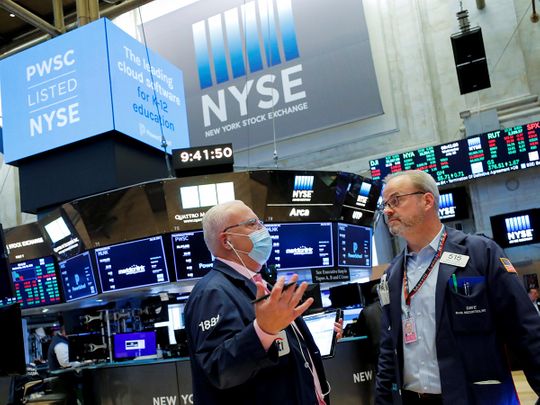
Dubai: Inflation figures from the world’s largest economy, the US, will be a closely watched economics event for markets in the week ahead, as investors inspect the data to gauge the pace of global economic recovery amid the pandemic.
Analysts evaluate how Friday’s stronger-than-expected US jobs report prompts markets to watch for clues on how the top economy is thinking about tapering its bond purchases, the first step in a process that would eventually lead to interest rate hikes in the country, followed suit by countries elsewhere.
There are a couple of inflation data expected this week, namely the consumer price index and the producer price index, which is scheduled to be released Wednesday and Thursday, respectively.
US jobs market rebounds
The latest figures were fresh evidence the US jobs market is on the mend, which has reignited fresh optimism among stock market traders, investors and analysts – with the only other factor, influencing the US Federal Reserve to make its decision on policy-related changes, being inflation.
So positive jobs and inflation data is enough to spur market watchers into thinking the central bank could announce in the next couple of months that it will scale back its support measures.
This is crucial as ending the bond-buying program is a first step toward raising interest rates. It’s the near-zero rate policy that has driven liquidity behind the stock market’s gains and kept rates low since.
US inflation expected to rise
Economists expect core inflation rising 0.4 per cent or 4.3 per cent year over year. Headline inflation was at 5.4 per cent in June, and core, excluding food and energy, was at 4.5 per cent.
Still, US stock gains were muted. The Dow Jones Industrial Average rose 0.41 per cent, the S&P 500 gained 0.17 per cent and the Nasdaq Composite dropped 0.4 per cent late last week.
The reason for this being that the good news on the economic front could bring pain for the bond market, as the US dollar will strengthen and yields will go up and that could limit the gains of stocks, analysts opine.
China education sector overhaul
In stock markets elsewhere in the world, international investors are still wrapping their head around what happened in the education sector in China, and expect that will continue to drive sentiment, particularly Asia-focused investors.
China announced a broad set of reforms for private education companies, seeking to decrease workloads for students. Investors, spooked by the severity of the crackdown on one of China’s fastest-growing and best-funded online sectors, mostly sold off heavyweight internet stocks in the region.
While the MSCI Asian benchmark has clawed back much of the prior week’s China-driven losses, it is still down just over 10 per cent from all-time highs hit in February. In contrast, the MSCI world shares index is trading just shy of a record high hit on Wednesday.
Selling pressure persists in Asia
Last week, MSCI’s broadest index of Asia-Pacific shares outside Japan still lost 0.35 per cent, dragged down by Chinese blue chips, which fell 0.56 per cent and Hong Kong Hang Seng index was down 0.46 per cent. However, Japan’s Nikkei ended up slightly at 0.11 per cent.
China also on Friday reported 124 confirmed cases, its highest daily count for new coronavirus cases in the current outbreak, fuelled by a surge in locally transmitted infections. Authorities have imposed travel restrictions in some cities. Thailand and Malaysia both reported record daily cases on Thursday.
“There are two main drivers of volatility in the market this week, firstly everything surrounding the Chinese regulatory drive, and secondly the severity of Delta outbreaks around the region,” said Carlos Casanova, senior economist Asia at Swiss private bank UBP (Union Bancaire Privée).












